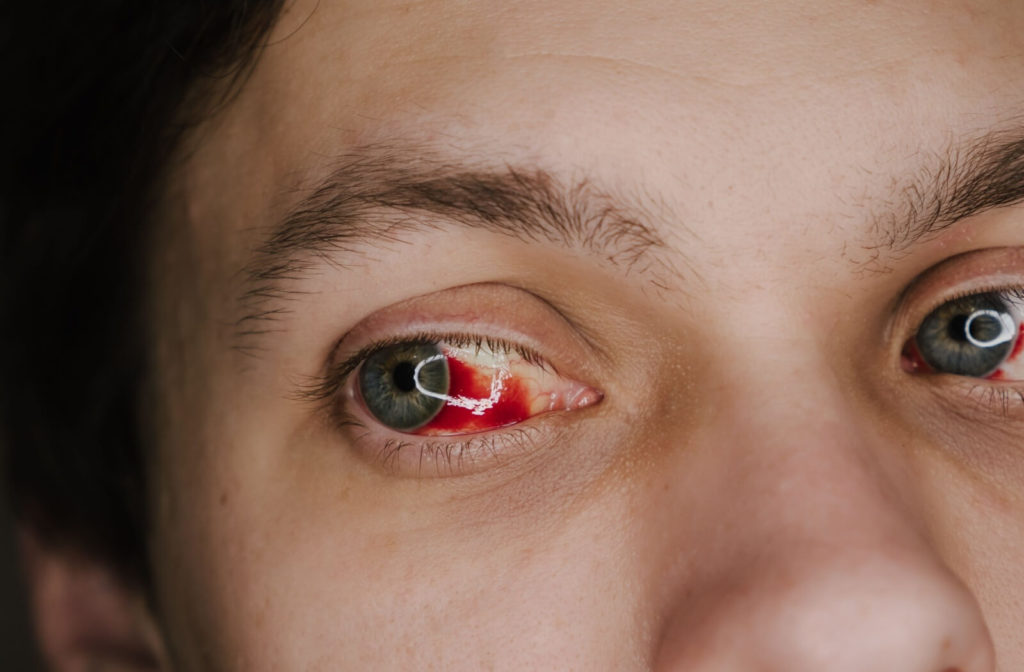If you’ve ever noticed a bright red spot on the white part of your eye, it’s natural to be alarmed. Broken blood vessels in the eye, also known as subconjunctival hemorrhages, are usually harmless and resolve on their own within two weeks.
Although they rarely indicate a serious issue, understanding the causes, signs to watch for, and steps to take can help you feel more at ease. Regular eye exams at Queensway Optometric Centre can help identify any underlying concerns and ensure your overall eye health is monitored effectively.
While these red spots might look dramatic, they often cause no discomfort or long-term harm. Nevertheless, recognizing when a broken blood vessel might signify something more serious is crucial for peace of mind and proactive care. Keeping your eyes healthy begins with understanding the basics.
What Causes Broken Blood Vessels in Your Eye?
Broken blood vessels in the eye happen when tiny blood vessels beneath the conjunctiva—the clear surface of the eye—rupture. This rupture allows blood to spread across the sclera, creating a vivid red appearance. Common causes include:
- Straining: Activities like heavy lifting, sneezing, or intense coughing can increase pressure in the blood vessels, causing them to break.
- Injury: Direct trauma to the eye, vigorous rubbing, or exposure to foreign objects can lead to a rupture.
- Health conditions: Conditions such as high blood pressure, diabetes, or blood-clotting disorders may weaken blood vessel walls, making them more prone to breaking.
- Medications: Certain blood thinners, such as aspirin or anticoagulants, can increase the likelihood of bleeding under the conjunctiva.
Frequent occurrences of broken blood vessels might warrant a closer look at your overall health. Speak to your optometrist if you’re concerned about these symptoms. Identifying triggers can also help you minimize recurrence.
Can Broken Blood Vessels in Your Eye Be Dangerous?
In most cases, broken blood vessels in the eye are not dangerous. They often heal on their own without treatment. However, in rare cases, they could signal underlying health problems, such as:
- High blood pressure: Recurrent broken blood vessels might indicate poorly managed hypertension.
- Blood disorders: Conditions affecting your blood’s ability to clot, such as hemophilia or platelet deficiencies.
- Trauma or infections: Direct injuries or infections to the eye can result in persistent or worsening redness.
While the majority of cases resolve naturally, it’s important to seek professional care if you’re experiencing other symptoms like pain, blurred vision, or swelling. At Queensway Optometric Centre, we offer comprehensive evaluations to identify any underlying issues and ensure your peace of mind.
How Do You Pop a Blood Vessel in Your Eye?
A broken blood vessel can occur from seemingly harmless everyday actions. Some common triggers include:
- Sneezing or coughing: Sudden, forceful actions that increase pressure in the head and eyes.
- Eye rubbing: Rubbing your eyes aggressively, especially when they’re irritated or itchy.
- Vomiting or physical strain: Excessive physical effort, such as during intense exercise or heavy lifting, can momentarily raise blood pressure and cause a vessel to rupture.
Even though broken blood vessels often occur accidentally, reducing your exposure to these triggers can help minimize their frequency. Understanding what causes them is key to maintaining healthy eyes.

When Should I Worry About Broken Blood Vessels in My Eye?
While most cases are harmless, certain symptoms may signal a more serious condition that requires attention. You should consult an optometrist if:
- The redness covers a large area or spreads beyond the sclera: This could indicate a deeper hemorrhage or injury.
- You experience pain, discomfort, or changes in vision: These symptoms may suggest additional complications, such as corneal damage or inflammation.
- The redness does not improve or disappear after two weeks: Prolonged redness could indicate an underlying issue that needs treatment.
- Recurrent episodes: Frequent broken blood vessels may be a sign of high blood pressure or other systemic conditions.
At Queensway Optometric Centre, we prioritize your eye health and are equipped to address these concerns with care and precision. Early intervention can help preserve your vision and overall well-being.
How to Heal Popped Blood Vessels in My Eye
Typically, no treatment is necessary, as the condition resolves on its own. However, there are steps you can take to promote healing and comfort:
- Using lubricating eye drops: Artificial tears can relieve irritation and keep your eyes moisturized.
- Avoiding eye strain: Limit screen time, take regular breaks, and ensure proper lighting when reading or working.
- Protecting your eyes: Avoid rubbing them and use protective eyewear, such as sunglasses with UV protection, during activities like sports, yard work, or exposure to strong winds.
While these measures can help your eyes feel more comfortable, persistent symptoms should always be evaluated by a professional.
Key Takeaways
- Broken blood vessels in the eye are usually harmless and they often heal on their own without treatment.
- Common causes include strain, injury, medications, or underlying health conditions like high blood pressure or blood-clotting disorders.
- Redness without pain or vision changes is typically not a concern, but symptoms like discomfort, blurred vision, or recurrent episodes should be evaluated.
- Eye protection, proper hygiene, and avoiding excessive rubbing can help prevent future occurrences.
- Routine eye exams are essential for detecting underlying issues and maintaining overall eye health.
The Importance of Regular Eye Exams
Although broken blood vessels in the eye are often harmless, they serve as a reminder of the importance of regular eye care. Routine eye exams can help detect potential issues early and ensure that your eyes remain healthy and strong. At Queensway Optometric Centre, we’re committed to providing you with care for your vision and overall well-being.
Eye exams do more than just check for broken blood vessels. They can also identify conditions like glaucoma, cataracts, and retinal diseases, which may not show symptoms until they’ve progressed significantly. Regular visits help us catch these issues early and provide effective treatments.
From checking for common conditions to offering advice on maintaining optimal eye health, our team is here to guide you every step of the way. Whether it’s routine care or addressing specific concerns, we’re dedicated to ensuring you have the knowledge and support you need.
Schedule your next visit with us today and take the first step toward protecting your vision for years to come.


